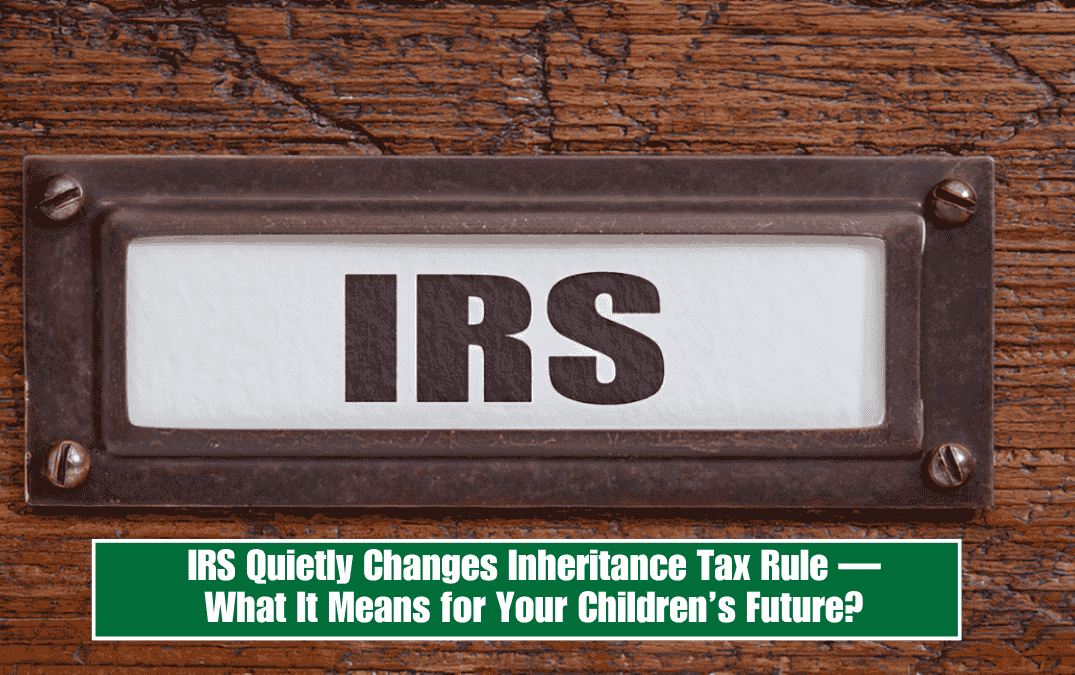In a significant but understated move, the Internal Revenue Service (IRS) has changed its position on the taxation of assets held in irrevocable trusts, potentially affecting the inheritance your children may receive.
This change focuses on the “step-up in basis” provision, which is an important aspect of estate planning that can have a significant impact on the capital gains taxes that heirs may owe.
Understanding the Step-Up in Basis
Traditionally, when someone inherits property, the asset’s cost basis is “stepped up” to its fair market value at the time of the original owner’s passing.
This adjustment effectively eliminates any capital gains earned during the decedent’s lifetime, lowering the potential tax burden when the heir sells the asset.
For example, if a parent paid $100,000 for a home that was worth $300,000 when they died, the heir would have a basis of $300,000. Selling the property for this amount would result in no capital gains tax.
The IRS’s New Ruling
However, the IRS recently clarified that assets held in certain irrevocable trusts may no longer be eligible for this step-up in basis upon the grantor’s death.
Specifically, if the assets are not included in the taxable estate upon death, they will retain their original cost basis.
This means that any increase in value between the time of purchase and the time of sale by the heir may be subject to capital gains tax.
This change is especially important for those who use irrevocable trusts to protect their assets, particularly when planning for long-term care.
Irrevocable trusts have long been a popular strategy for protecting assets from being depleted due to expenses such as nursing home costs, allowing people to qualify for programs like Medicaid.
Implications for Estate Planning
The IRS clarification emphasizes the importance of meticulous estate planning.
Assets held in an irrevocable trust but not included in the taxable estate may no longer benefit from the step-up in basis, potentially resulting in significant capital gains taxes for heirs.
This development necessitates a reevaluation of existing estate plans to ensure they are consistent with the new tax implications.
Navigating the Changes
To successfully navigate these changes, consider the following steps:
- Review Existing Trusts: Assess whether your current irrevocable trust includes provisions that allow for the inclusion of assets in your taxable estate, thereby preserving the step-up in basis.
- Consult Estate Planning Professionals: Engage with estate attorneys or financial advisors to understand the nuances of the new ruling and to restructure your estate plan if necessary.
- Explore Alternative Strategies: Depending on your financial situation, other estate planning tools, such as revocable trusts or direct gifting, might offer more favorable tax outcomes under the new guidelines.
Broader Tax Landscape
It’s also essential to be aware of other impending changes in the tax landscape:
- Estate and Gift Tax Exemptions: For 2025, the federal estate and gift tax exemption is set at $13.99 million per individual, up from $13.61 million in 2024. This means a married couple can shield up to $27.98 million from federal estate taxes. However, this elevated exemption is scheduled to sunset in 2026, potentially reducing the exemption amount by approximately half.
- Annual Gift Tax Exclusion: The annual exclusion for gifts increases to $19,000 per recipient in 2025, up from $18,000 in 2024. This allows individuals to gift up to this amount to as many people as they wish without incurring gift tax or utilizing their lifetime exemption.
State-Level Considerations
In addition to federal tax laws, be aware of state-level estate and inheritance taxes. Some states have their own tax systems, which may have different exemption amounts and regulations.
To fully understand the potential tax implications for your heirs, you must first understand the laws specific to your state.
The IRS’s recent clarification on the taxation of assets in irrevocable trusts represents a significant shift in estate planning.
By proactively reviewing and possibly revising your estate plan, you can better position your assets to minimize tax liabilities while also ensuring that your children’s inheritance is properly preserved.
Given the complexities of these changes, it is strongly advised to consult with estate planning professionals in order to effectively navigate this evolving landscape.















